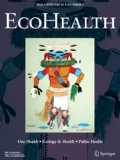In spite of what seems to be an increasingly divided world, mirrored in the disciplinary divides so evident in modern science, we are pleased to report on a significant bright spot, to which ecology and health is now contributing. In 1997, the US National Science Foundation (NSF) initiated a unique graduate research training program as an antidote to disciplinary fragmentation. The program’s mission is to foster integrative research and graduate training through cross-disciplinary collaboration among faculty. It has expanded to more than 50 US universities, with at least this number of collaborating institutions in other countries. Graduate research training at the interface of ecology and health can now be counted among the beneficiaries of the program with awards to the University of Hawaii and University of Wisconsin, for disease ecology and coupled human–natural systems research, respectively. As a result, novel interdisciplinary graduate curricula are being developed at both universities, and a total of nearly 60 PhD fellowships will be awarded over 5 years.
NSF describes the purpose of its program, called Integrative Graduate Education and Research Traineeship Program, or IGERT for short, as follows. [IGERT] is intended to catalyze a cultural change in graduate education, for students, faculty, and institutions, by establishing innovative new models for graduate education and training in a fertile environment for collaborative research that transcends traditional disciplinary boundaries. It is also intended to facilitate greater diversity in student participation and preparation, and to contribute to the development of a diverse, globally-engaged science and engineering workforce (http://www.nsf.gov/crssprgm/igert/intro.jsp). Thus, if ever there was a program aimed at creating the new cadre of transdisciplinary scientists and practitioners skilled in bridging disciplines, cultures, and communities this would be it.
The new IGERTs at Hawaii’s Manoa campus and Wisconsin’s Madison campus are, respectively, “NSF IGERT: Integrating Ecology, Conservation, and Pathogen Biology” (http://www.hawaii.edu/ecohealth/ecpb.html) and “NSF IGERT: Vulnerability and Sustainability in Coupled Human–Natural Systems” (http://www.sage.wisc.edu/IGERT/index.html). Both address transdisciplinary themes which are central to this journal and new organization, International Ecology and Health Association.
NSF IGERT Program’s overall mission is to facilitate the training of a new cadre of scientists particularly skilled in working across disciplines. To this end, they are based on a 2-year core curriculum, with supplementary training and research opportunities, including an outreach program to underrepresented minority students, international research experiences, and teaching and other professional development opportunities. The Hawaii and Wisconsin IGERT curricula are organized following global, regional, and local scales of inquiry, and interweaves three threads taught in synchrony: fundamental knowledge, transdisciplinary approaches, and professional/leadership skills. Depending on individual career orientation and research interests, each IGERT scholar will work with interdisciplinary faculty mentor teams on research proposals, multi-stakeholder policy projects, and integrative research projects.
Benefits of these IGERTs are not limited to IGERT Fellows and the host institutions, but extend to international partners and their students. For example, Hawaii’s special curriculum on evolutionary ecology applied to the management of biodiversity, invasive species, and infectious diseases is open to graduate students besides IGERT awardees. Also, it builds on and will strengthen cooperative research and graduate training partnerships with various institutions in the Asia-Pacific region, including universities in Australia, New Zealand, Thailand, Vietnam, China, and a number of Pacific Island nations and US Territories. Wisconsin’s IGERT will further jumpstart the redesign of the curriculum for the broader Nelson Institute, where part of the institute’s mission highlights making discoveries at the interface of scientific disciplines.
In many ways, the present global state of affairs in terms of advancing peace, environmental protection, human rights, and health, by bridging our cultural divides, could not be more discouraging. However, programs specifically designed for bridging disciplines—and attempting to do so across international and cross-cultural boundaries—such as the NSF IGERT offers significant hope. These programs pioneer a new approach to graduate education that will serve as a model for programs that seek to integrate research in the humanities, social sciences and natural sciences. Importantly, they will impart to a cadre of future scholars and leaders the necessary skills to conduct research that bridges disciplinary divides and to forge strong links to decision-making and public policy, business and nongovernmental organizations, and civil society.
We see the emergence of the IGERT program as one of just many hopeful signs of an increasing recognition of the need for transdisciplinary research and practice, such as that which the authors of this journal’s articles are seeking to advance.
Author information
Authors and Affiliations
Corresponding author
Rights and permissions
About this article
Cite this article
Wilcox, B.A., Patz, J. Bridging Disciplinary Divides: A National Graduate Training Program Signals a Hopeful Trend. EcoHealth 3, 219–220 (2006). https://doi.org/10.1007/s10393-006-0071-3
Published:
Issue Date:
DOI: https://doi.org/10.1007/s10393-006-0071-3

